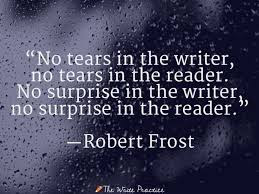Emotion is part of our make-up as a living human being. We experience different emotions throughout our daily lives. Writers must make use of emotions to bring their stories, poems, and essays to life.
Robert Frost said, "No tears in the writer, no tears in the reader. No surprises in the writer, no surprises in the reader."
If you're a writer who writes without emotion, it will show in your finished product. If there is little to no emotion in your writing, it ends up appearing like a speaker who speaks in a complete monotone.
We once took a city tour on a bus in Prague. They advertised that the tour would be given in several languages. It turned out the guide could not actually speak those several languages. Instead, he had memorized the complete tour in English, Japanese and a couple other languages. Because he did not actually know the language, there was no inflection on words, no emotion in his voice. It came over as a total monotone. Yes, we learned something about Prague, but it became almost laughable. It was a perfect example for me about the importance of emotion in speaking and writing.
Writers need emotion in what they write to connect with their readers. The writer must feel something in order to make the reader feel it, too. One of the best ways to do that is to show, not tell. If you write, 'Greta cried.' I know what she did, but I don't feel much for her. If you write, 'The lump in Greta's throat gave way to tears and great sobs. She wiped her cheeks but could not stem the flow.' Maybe then I will think Oh, the poor girl.
At certain times, we've been taught to keep our emotions in check, whether by parents or teachers. As a writer, you can let the emotions flow without worrying about what someone will think. If I write a scene about a pioneer woman encountering a rattlesnake in her garden as she is picking beans, I need to use emotion. Saying 'Ellen saw a rattlesnake at the end of the row of beans.' alerts the reader, but there is no emotion. Write something like 'When she spotted the rattlesnake at the end of the row of beans, Ellen stopped, started to shake. She could not pick up her feet, only stared and prayed the viper would not move closer. Finally, she turned and ran to the barn to find Jesse, a scream trapped in her throat.'
Showing how the character felt and reacted reaches out to the reader with emotion, invoking emotion in them in return.
Even when writing an essay, let your feelings come through. Do it when writing poetry, fiction, creative nonfiction. About the only thing I can think of where you might not use it is in a technical article. Even then, a few technical writers might conclude with their own feelings about the topic. Not always but a possibility.
Don't keep those emotions trapped inside. Use them in your writing, and you'll be a better writer.




.jpg)




